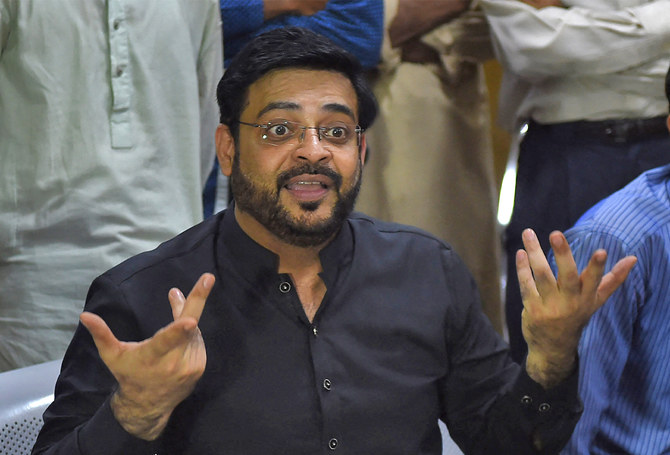KARACHI: A high court in Pakistan’s southern Sindh province has restrained a medical board from exhuming the body of televangelist and politician Aamir Liaquat Hussain to conduct an autopsy, a lawyer for Hussain’s family said on Wednesday.
Hussain, a politician, former minister and controversial television host, was found dead at his Karachi residence on June 9. Police said at the time they were investigating the circumstances surrounding the death and wanted to conduct an autopsy. However, they relinquished custody of the body to Hussain’s family after they refused an autopsy, a decision that was backed by a local magistrate. Hussain was buried the following day.
Last week, a Karachi judicial magistrate ordered authorities to conduct a post-mortem after which a six-member medical board was set up. The board was meant to examine the body tomorrow, Thursday. The order came following a plea by a citizen that Hussain’s death had been “mysterious” and needed to be investigated.
Hussain’s family subsequently challenged the decision in the Sindh high court.
“The Sindh High Court today restrained the medical board for exhuming the body and served notices to respondents for the upcoming hearing which is going to be held on next Wednesday,” Zia Awan, the lawyer for Hussain’s family, told Arab News.
“His children told the court that they didn’t suspect any foul play and it was their religious right to not conduct autopsy,” Awan added. “We also told that court that a petitioner who had no relation with the deceased and had regularly been criticizing him on social media had filed a petition [for an autopsy] as a publicity stunt.”
Hussain’s death came weeks after he announced he would leave Pakistan following a controversy surrounding his third marriage to a teenager, Dania Shah, that led to intense criticism of the premier televangelist on mainstream and social media. Shah, reportedly not of legal age, had accused Hussain of inflicting violence on her and regularly using drugs and alcohol during their brief relationship.
Hussain repeatedly denied the charges but the story was widely discussed in Pakistan and raised questions about his credentials as a religious expert, leading a teary-eyed Hussain to announce in a video last month that he had decided to leave Pakistan for good.
















